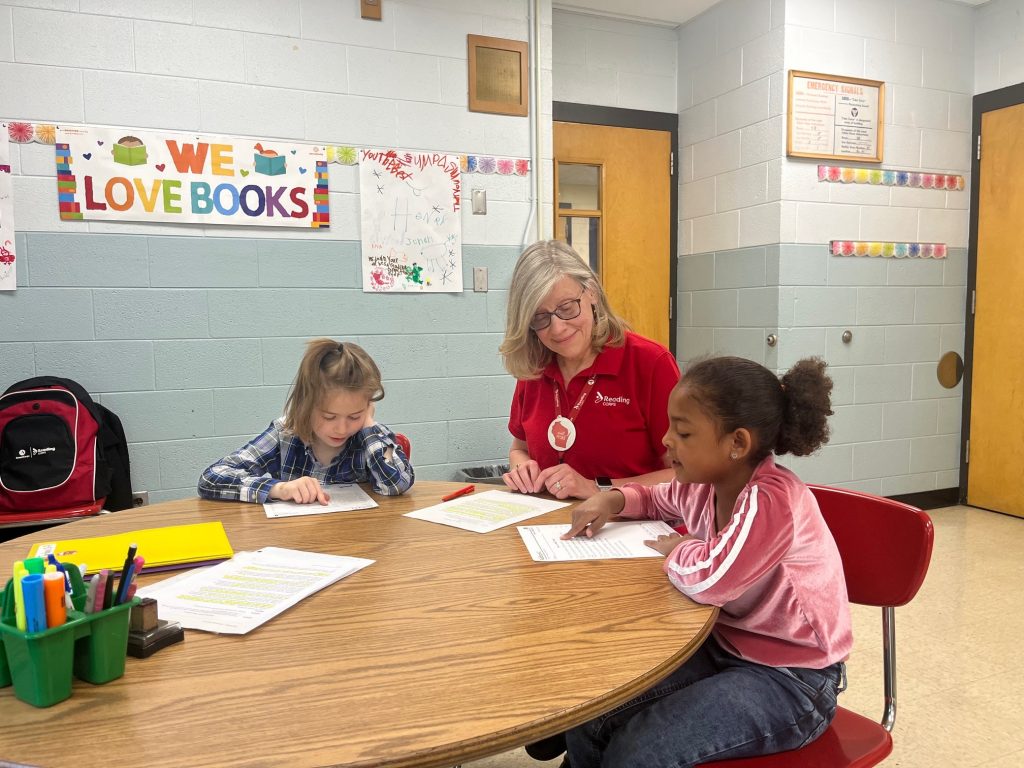Reading Corps Brings High-Impact Tutoring to Wisconsin Schools
AmeriCorps program serves some 60 school districts; only funded through next year.

Dawn Orchel tutors Jonah, left, and Jordynn, right, at Milwaukee’s Parkside School for the Arts. Corrinne Hess/WPR
On a recent Friday at Milwaukee’s Parkside School for the Arts, Dawn Orchel uses her finger to underline a series of words: coat, goat, boat, float.
In unison, first graders Jordynn and Jonah read the words. If they make a mistake, they start again.
“When I slide my finger, read the word,” Orchel tells the children. “We end on toad. What a fun word.”
The exercise goes on for about 10 minutes before Orchel, a volunteer with Wisconsin Reading Corps moves onto the story of the day. It’s about baking a pizza.
The girls take turns reading sentences. They stop often on challenging words, but they get through it.
“Excellent listening to each other,” Orchel says. “Now we’re going to read the last sentence together, and you’re going to match my voice and speed.”
The girls finish and put stamps on a poster marking their success before heading back to class.
They’ll be back tomorrow for another 20 minute tutoring session.
Jordynn and Jonah are part of the largest high-impact tutoring program in the country.
Reading Corps is a nationwide AmeriCorps program that’s in about 60 Wisconsin school districts across the state, including in Milwaukee, Racine, Kenosha, Dane, Brown, La Crosse, Sauk, Marinette, Eau Claire and Juneau counties.
While AmeriCorps funding has been cut by the Trump administration, disrupting many programs in Wisconsin and nationwide, Reading Corps is funded through next year, said Itzel Galindo, executive director of Wisconsin programs.
Leah Donohue, the math and reading intervention teacher at Parkside School, said the instruction is a supplement to what teachers can’t always get to in the classroom.
“We’ve had many many students, exit the program, which means they’ve met targets,” Donohue said. “Even though we all work very. very hard in the classroom to help kids get on on grade level, that one on one has made a significant difference.”
The program uses one-on-one or two-on-one tutors to teach children in kindergarten through third grade to read, using the now-preferred approach known as “science of reading.”
In 2023, the state Legislature passed a bipartisan bill to change how children are taught to read using the science of reading.
In other words, instead of being taught reading through pictures, word cues and memorization, children are taught using a phonics-based method that focuses on learning to sound out letters and phrases.
School districts are moving toward this approach, but the process has been slow.
This year, 64 students at Parkside School for the Arts in Milwaukee have gotten high-impact tutoring. But the school, located in Milwaukee’s Bay View neighborhood, has 853 students.
According to the latest state report card for Parkside School, 63 percent of students are “approaching” or “developing” with reading proficiency, which means about 537 of the students would benefit from tutoring.
There are about 55 students on the waiting list.
Given that only 31 percent of Wisconsin students statewide score as “proficient” in reading on the latest National Assessment of Educational Progress, the state can’t tutor its way out of the reading crisis.
But it’s a start.
Nancy Waymack is the director of policy and partnerships at Stanford University’s National Student Support Accelerator. She said some states have designated funds for high-impact tutoring. Wisconsin does not. However, some school districts have focused on it using COVID-19 funding money.
Waymack said any time a school or district can designate time for students struggling with reading or math to one-on-one or small group time, it will help.
“There’s a really strong evidence base behind it,” Waymack said. “Especially since some students were not able to learn at the pace they might have otherwise during the pandemic, and certainly some students are just behind for a number of different reasons.”
The Wisconsin Reading Corps program is funded by the federal government and the state.
Gov. Tony Evers has proposed $3 million per year in the 2025-27 budget for “high-dosage” reading tutors.
“While high-dosage tutoring is not required under Act 20, it is an important strategy in addressing literacy achievement,” Evers’ budget states. “This type of tutoring is provided to no more than four students per tutor, uses high-quality instructional material aligned with classroom content, consists of at least three sessions per week during school hours, and is conducted by professionally trained tutors.”
Reading Corps brings high-impact tutoring to schools across Wisconsin was originally published by Wisconsin Public Radio.
If you think stories like this are important, become a member of Urban Milwaukee and help support real, independent journalism. Plus you get some cool added benefits.

















